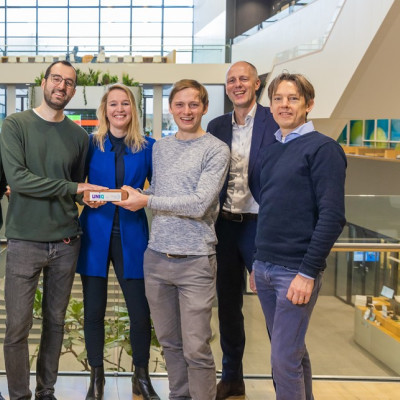
2023-03-03
Visited : 2373
SoundCell uses graphene to gain insight into whether a bacterium is still alive after administering an antibiotic.
SoundCell, a spin-off of Graphene Flagship partner TU Delft, has entered this new year with a bang. Proof-of-concept fund UNIIQ, together with Delft Enterprises, is investing €350,000 in SoundCell to facilitate the company to continue developing its graphene technology for single cell resolution antibiotic sensitivity testing.
SoundCell develops innovative technology that can measure the vibrations produced by living bacteria. This technology has major implications for the detection and prevention of antibiotic resistance, as it would enable patients to receive effective medication against bacterial infections much faster than today’s standard.
So how does graphene in this context work?
To accurately measure the vibrations of a single bacterium, SoundCell uses membranes made of graphene – a nanomaterial unique for being the world’s thinnest known material as well as a material that is highly flexible, conductive, and strong. Due to the extremely sensitive properties of graphene and the biological processes in bacteria, SoundCell provides insight into whether a bacterium is still alive (vibrating) after administering an antibiotic.
SoundCell’s first experiments with E. Coli bacteria showed that if the bacteria were resistant to the antibiotic, the vibrations continued at the same level. When the bacteria were non-resistant, the vibrations subsided after administering the drug.
The measured vibrations are extremely small, at least ten thousand times smaller than the thickness of a hair.
Current methods for measuring the antibiotic resistance of bacteria rely on their cell division time. Because bacteria divide slowly, determination can take from several days, even up to weeks, depending on the type of the microorganism. With SoundCell’s technology, however, doctors will be able to administer effective antibiotics to patients within mere hours.
SoundCell’s ambitious team includes Aleksandre Japaridze and Irek Rosłoń, both also involved in the research at TU Delft where the technology was discovered. There is no shortage of attention in this enterprise: the impressive results of SoundCell’s technology were published in Nature Nanotechnology.
The Delft start-up plans to use this new investment from UNIIQ to develop a prototype that can be used and tested in a hospital and to conduct additional clinical research.
Of the new €350,000 investment, Managing Director Irek Rosłoń comments that the funding will help SoundCell’s technology move from an academic laboratory to a more commercial environment.
“With the UNIIQ investment, we will be able to take this important step and hit the ground running,” says Rosłoń.
“We are extremely proud of achieving this milestone and look forward to using our technology to make a significant positive impact on society.”
Read the original article on Graphene Flagship.